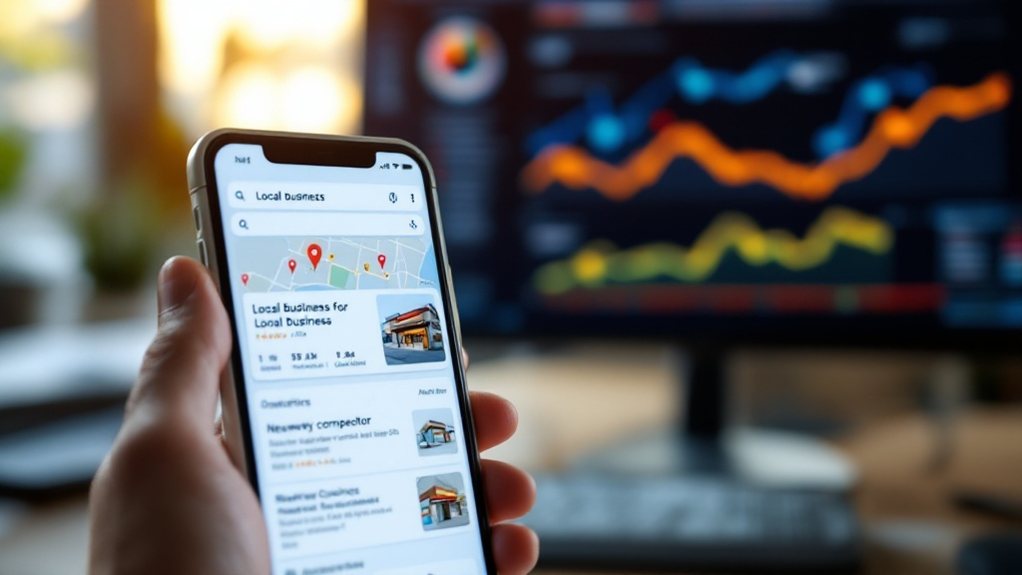Effectively integrating 'near me' search engine optimization (SEO) with pay-per-click (PPC) advertising can help you maximize your local online visibility, attract highly-targeted customers, and drive measurable results across both channels. Develop a unified keyword strategy, leverage PPC insights to enhance SEO, optimize landing pages for both SEO and PPC, and create content optimized for 'near me' searches. By combining these strategies, you can enhance your overall visibility and competitiveness in the local market. To learn more about the best practices for integrating 'near me' SEO and PPC campaigns, continue reading.
Understanding the Importance of Location in SEO and PPC

The importance of location in both SEO and PPC cannot be overstated. Location pages are crucial for appearing in local search results, supporting Google Business Profiles, and enhancing user experience. Optimized location pages leverage local keywords and search intent, increasing SEO visibility. Location pages demonstrate local expertise and build trust with potential customers. PPC campaigns can target specific locations, ensuring ads reach local audiences. Reviews and local citations also play a vital role, influencing rankings, credibility, and customer trust. Consistent citations across directories form the foundation of local SEO strategies. By understanding the significance of location in both SEO and PPC, businesses can create a comprehensive strategy to reach and convert their target audiences.
Developing a Unified Keyword Strategy for Local SEO and PPC

To effectively combine your 'near me' SEO and PPC efforts, you'll need to align your keyword strategies across both channels. Leverage performance data to select high-value, location-specific keywords that cater to local user intent. By unifying your keyword focus, you can optimize your content and ads for maximum impact in your local market. Integrating your SEO and PPC strategies can provide a significant competitive advantage in your local market.
Align SEO and PPC Keywords
When aligning your SEO and PPC keyword strategies, it's crucial to maintain consistency across both channels. Ensure that you use the same keywords in your SEO and PPC campaigns to present a unified brand message. Incorporate local modifiers like "near me" and city names to target local searches effectively. Targeting nearby areas the business serves can increase visibility to potential customers in adjacent areas. Quality modifiers like "best" or "top" can highlight your service quality and attract users seeking high-quality offerings. Applying occasion or service type modifiers can further refine your search queries. Optimizing your content with these keywords naturally will improve your search engine rankings. By aligning your SEO and PPC keywords, you'll create a cohesive marketing approach and enhance the overall effectiveness of your campaigns.
Data-Driven Keyword Selection
Conducting thorough keyword research is the foundation for a successful local SEO and PPC strategy. Utilize tools like Google Search Console, Ahrefs, and Semrush to analyze your website's performance and your competitors' strategies. Ubersuggest can uncover long-tail keywords and provide competitor insights. Leverage Google Autocomplete and People Also Ask to identify popular local search phrases. Analyze search intent, differentiating between navigational, informational, transactional, and commercial queries. Incorporate location modifiers, product/service terms, review keywords, and voice search patterns to refine your target keywords. By aligning your SEO and PPC keyword strategies, you'll optimize your campaigns for maximum visibility and conversion. Use PPC data to identify high-volume, high-intent keywords to target organically.
Optimize for Local Intent
Optimizing for local intent is crucial when developing a unified keyword strategy for your local SEO and PPC campaigns. Incorporate location-specific keywords like “near me” and “[city] plumber” to align with user search queries. Leveraging location-based signals can significantly enhance the relevance and effectiveness of your digital marketing efforts. Target long-tail, high-conversion keywords in your PPC ads, and use proximity signals in your SEO content. Leverage Google Business Profile optimization and location-based ad extensions to boost your visibility. Continuously monitor local pack rankings, Google Maps presence, and location-based conversion rates to inform your strategy. By aligning your SEO and PPC efforts around local intent, you'll enhance your overall digital marketing impact and better connect with your target audience.
Leveraging PPC Insights to Enhance SEO Performance

Effective PPC campaigns can provide invaluable insights to enhance your SEO performance. By leveraging PPC data, you can optimize your SEO strategies for faster results. Here are 4 ways to utilize PPC insights:
- Identify high-converting keywords to integrate into your SEO content.
- Analyze PPC ad copy to improve your meta descriptions and title tags.
- Use PPC audience insights to refine your SEO targeting and content creation.
- Uncover competitor strategies through PPC analysis to inform your SEO efforts.
Analyzing PPC geographic insights can enhance your local SEO strategies.
Combining PPC and SEO allows you to maximize visibility, credibility, and growth opportunities across search channels.
Optimizing Landing Pages for Both Local SEO and PPC
With the insights gained from your PPC campaigns, you can now focus on optimizing your landing pages for both local SEO and PPC performance. Localize your content by including relevant keywords, ensure NAP consistency, and integrate Google Maps. Showcase customer reviews to build credibility, and make your pages mobile-friendly. Craft a clear value proposition, use visuals to engage visitors, and include strong CTAs. Implement schema markup to enhance search visibility and leverage it for your PPC ads. Targeting specific local keywords like "pedicures in Des Moines" is effective Align your PPC targeting and ad copy with successful SEO strategies, and integrate your landing pages to boost conversion rates through personalized local offers.
Creating Content Optimized for 'Near Me' Searches
Creating content that's optimized for "near me" searches goes beyond simply stuffing keywords. You'll need to thoughtfully integrate location-specific phrases and ensure your content is genuinely useful for local customers. Over 82% of smartphone shoppers use near me searches, so incorporating this behavior into your content strategy is crucial. From leveraging Google My Business to curating a solid review strategy, there are several tactics to make your online presence more relevant in your community.
Keyword-Driven Content
When crafting content optimized for 'near me' searches, you'll want to start by conducting thorough keyword research. Use tools like Google Keyword Planner and Google Trends to identify relevant location-based keywords. Then, incorporate long-tail keywords to increase specificity and conversion rates. Analyze your target audience's intent and behavior, and examine how your competitors are using 'near me' keywords. Finally, seamlessly integrate your target keywords into your content without keyword stuffing.
To enhance your 'near me' content, you can:
- Create location-relevant content that resonates with the local community.
- Utilize AI tools to generate high-quality, location-specific content efficiently.
- Adopt a conversational approach to align with users' search intent.
- Diversify your content types, from FAQs to blogs and social media posts.
Near Me SEO increases visibility, allowing businesses to appear in local search results. This can help boost the effectiveness of your 'near me' content strategy.
Location-Specific Optimization
To effectively optimize your content for 'near me' searches, you'll first need to ensure your website's structure is location-specific. Organize your website with sections or pages dedicated to specific service areas, and implement schema markup to define your coverage. Develop content addressing local needs and preferences, and include interactive maps to highlight your physical presence. Link location pages to boost their authority. Ensure your Google Business Profile has accurate, location-focused details and leverage service area listings. Maintaining accurate and up-to-date information in the GBP is important for local SEO success. Maintain consistent business listings across directories and use location-based headlines to attract local searches. Regularly audit your SEO to identify and fix issues affecting your local search performance.
Engaging Local Narratives
By highlighting your local business involvement, creating content that addresses community issues, and showcasing your partnerships, you can craft engaging narratives that resonate with your target audience and support your local SEO efforts. These narratives can take the form of:
- Blog posts on relevant local trends or news
- Social media updates about your community engagement
- Video content showcasing your local services or products
- Podcasts discussing local topics or interviewing influential figures
Weaving these local stories into your content marketing strategy can increase your brand's credibility, enhance customer engagement, and provide unique selling points over your competitors, ultimately driving loyalty and supporting your local SEO.
Effective Budget Allocation Between Local SEO and PPC
Allocating your budget effectively between local SEO and PPC is crucial for maximizing your marketing efforts. While PPC can deliver quicker results, local SEO offers a more cost-effective long-term strategy. A balanced approach is often ideal, with a focus on data-driven decision-making.
| Allocation Consideration | PPC | Local SEO |
|---|---|---|
| Conversion Rates | Higher | Lower |
| Cost Efficiency | Short-term | Long-term |
| Speed of Results | Faster | Slower |
| Geotargeting | Stronger | Weaker |
| Budget Scaling | Incremental | Static |
Regularly review your performance metrics, adjust your budget allocations, and leverage the unique strengths of each channel to achieve your local marketing goals.
Enhancing Visibility and Competitiveness Through SEO-PPC Integration
Combining SEO and PPC for "near me" searches can significantly boost your visibility and competitiveness in local markets. By dominating more search engine results pages (SERPs), you can reinforce your brand, achieve instant search ranking, and secure valuable SERP real estate. Furthermore, you can leverage "near me" keywords across both strategies to target specific search intent and optimize your local listings for enhanced performance.
To gain a competitive edge, consider these strategies:
- Share keyword data between SEO and PPC teams to uncover opportunities and improve targeting.
- Utilize PPC insights to refine your SEO approach and accelerate data-driven decision-making.
- Implement PPC remarketing campaigns to retarget and nurture leads.
- Integrate SEO and PPC to support different stages of the sales funnel and enhance the user experience.
Optimizing PPC Campaigns for Local 'Near Me' Searches
How can you optimize your PPC campaigns to effectively target local "near me" searches? Leverage geo-targeting and location extensions to reach relevant audiences. Focus on location-based keywords, schedule ads strategically, and optimize for mobile users. Utilize SEO insights to inform your PPC strategy, including high-performing local terms and content ideas. Refine your campaign structure with single-keyword ad groups, tight organization, and location-specific targeting. Craft localized ad copy and landing pages to build trust and encourage conversions. Track calls, leads, and sales, then continually optimize your campaigns based on performance data and changing "near me" search trends.
Combining Analytics and Data Insights for Local SEO and PPC
Combining analytics insights with targeted keyword research is crucial for aligning your local SEO and PPC efforts. By analyzing organic traffic patterns and user behavior, you can create more relevant and effective PPC campaigns that resonate with your local audience. Integrating these data-driven insights ensures your marketing strategies work together to drive optimal results.
Integrated Analytics Insights
Leveraging the power of consolidated analytics can provide unparalleled insights, empowering you to make informed decisions that drive remarkable results. By combining SEO and PPC data, you gain a comprehensive understanding of customer search behavior, allowing you to:
- Optimize performance metrics, such as conversion rates and click-through rates, to refine your strategies.
- Analyze competitor SEO and PPC tactics to identify opportunities for market share growth.
- Focus on return on investment (ROI) to allocate resources effectively between SEO and PPC.
- Continuously adapt your strategies based on data-driven insights, ensuring your campaigns remain responsive to evolving customer needs.
Embracing this data-driven approach lays the foundation for a truly integrated and adaptable marketing strategy.
Keyword Research Alignment
Effective keyword research is the foundation for success in both local SEO and PPC advertising. By aligning your SEO and PPC keyword strategies, you can enhance the impact of your digital marketing efforts. Leverage high-performing SEO keywords in your PPC campaigns to ensure consistent targeting and messaging. Conversely, use PPC data to refine your SEO keyword selection, identifying the most effective location-specific terms. Integrating SEO and PPC insights allows you to develop a comprehensive understanding of your target audience's search behavior. This alignment ensures your organic and paid search results are optimized for the same local customers, maximizing your visibility and driving more qualified traffic to your business.
Best Practices for Integrating 'Near Me' SEO and PPC Campaigns
When it comes to optimizing your local SEO and PPC campaigns, you'll want to ensure a seamless integration between the two. This means:
- Aligning your keyword targeting across SEO and PPC to maintain consistency.
- Optimizing landing pages for both organic and paid traffic to enhance the user experience.
- Leveraging PPC data to inform your SEO strategy and vice versa.
- Collaborating closely between your SEO and PPC teams to share insights and maximize ROI.
